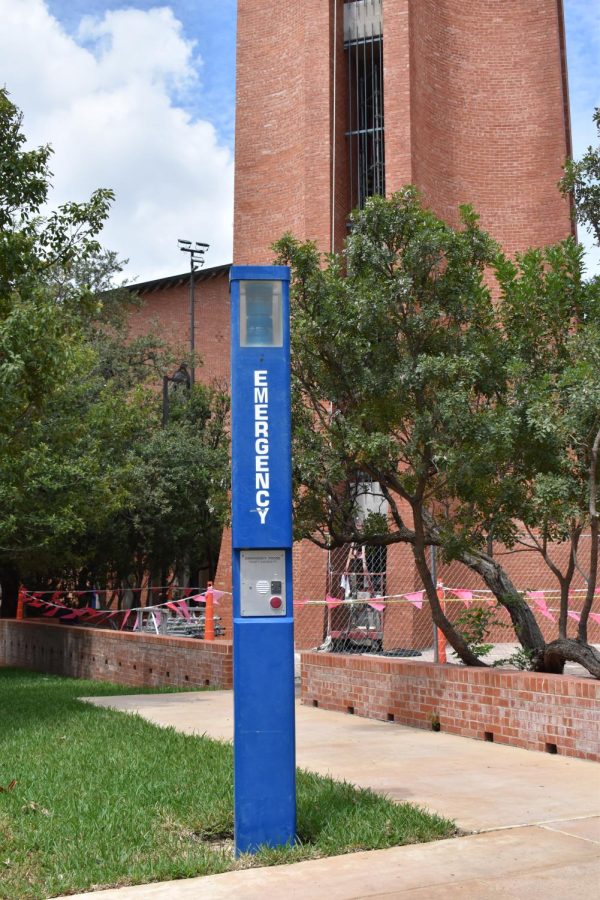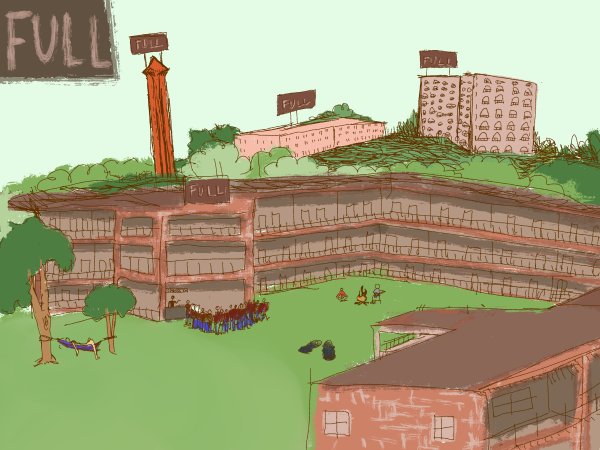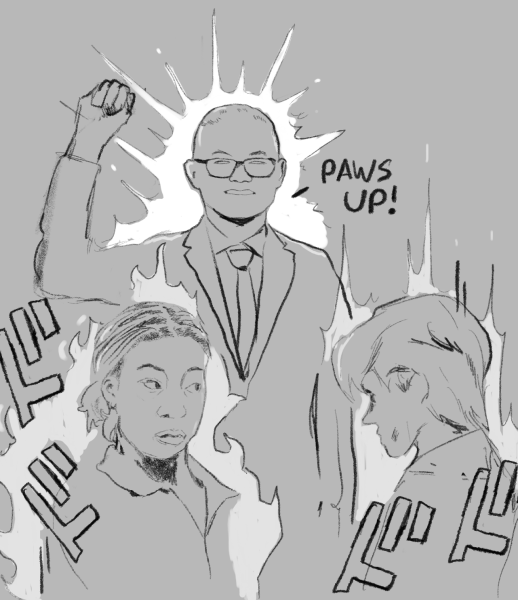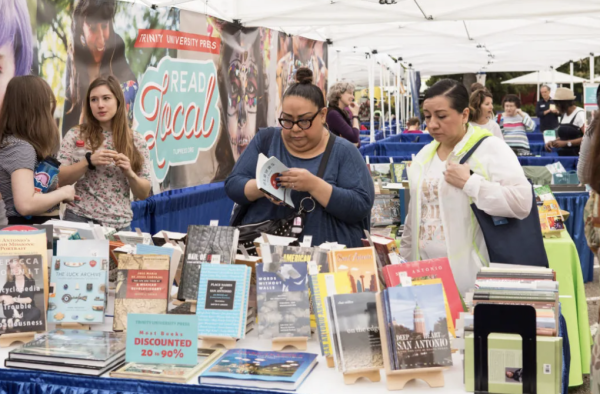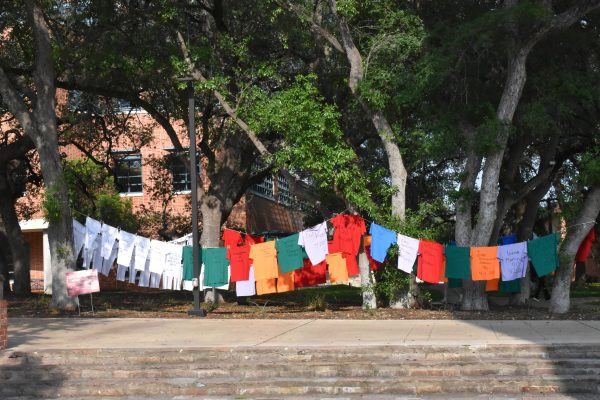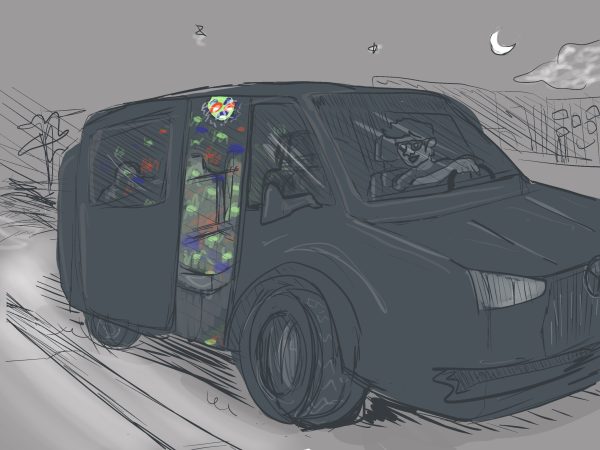Not Just Blue Lights: How Trinity keeps students safe
TUPD offers resources to help students feel secure on campus
Trinity’s Emergency Blue Light System.
On college campuses across the United States, blue light emergency poles are a common sight. These tall looming poles are a very public indicator that a college campus advocates for student safety. Each pillar has a red button that, once pushed, immediately notifies a Trinity University Police Department (TUPD) dispatcher. There are six poles on campus: three near Prassel, Thomas and North residence halls, one near TUPD offices, one near the Witt center and the last near the Storch Memorial Building. However, there are more resources for students in emergencies than blue poles.
Students are increasingly busy balancing academics, extracurriculars and personal care, which can result in less time to take advantage of resources that are available to keep them safe.
“Students don’t reach out a lot to us directly,” said John Rowse, assistant chief of police. “We hear a lot [of safety concerns] from RAs [Resident Assistants]… they’ll share student concerns brought to them each year,” Rowse said.
There are many ways on campus a student can get help if they are ever in an emergency, the first being TUPD. The TUPD emergency number is (210) 999-7000 and the non-emergency number is (210) 999-7070.
“Between students and staff, y’all are going to be the first ones that see something that’s out of place,” Rowse said. Rowse also emphasizes the importance of recognizing actions individuals are engaging in. “Look for suspicious activity…what actions are they performing that make them look out of place?”
Aside from calling, there is an app available for download on smartphones or tablets called Elerts See Say. This app has features such as a digital escort, an option to report suspicious activity and an option to call TUPD.
The digital escort feature is available through the section that says “EscortMe” and instructs the student to press their phone screen until they reach their intended, safe location. Through “EscortMe” on Elerts, there is an option for students to either let the dispatch center know that they have reached their location or call TUPD. There is also a built-in 10-second countdown feature that activates as soon as a student lifts their finger off the screen and alerts a TUPD officer to the phone’s location if the student doesn’t indicate that they are safe within 10 seconds.
TUPD can always assist in an emergency outside of Elerts as well.
“If a student calls for something stolen from their car, the second they call, someone will be dispatched,” Rowse said.
The actions afterward depend on what a student is calling TUPD for. An officer can meet with the caller or, in the case of personal theft, a report can be completed over the phone.
There is also a physical escort service available to students. TigerTracks is a courtesy service provided to Trinity students who call the TUPD non-emergency number.
Once a student calls the number and tells TUPD they need an escort, an officer or designated student in a golf cart will arrive in no more than five minutes. If a golf cart is not available, an officer on a bike or an officer without a vehicle will walk with the student to their destination.
The TUPD website also has free information available to students if they want to know more about ways they can protect themselves on campus. Programs such as “Shots Fired on Campus” teach students strategies for dealing with an active shooter on campus.
TUPD recognizes the importance of being a visual and active presence on campus. With September being campus safety awareness month, TUPD is hosting events like “Copcorn,” handing out popcorn outside of Coates Library, to inform students about rainbow fentanyl and how it can be fatal in some cases.
“We understand that students are busy,” Rowse said.
Even through events like “Copcorn,” TUPD officers only have a few minutes to talk to students. “Because they’re going from one class to the next … but we’re also there for those that have the time and want to ask questions,” Rowse said.
Through quick interactions between officers and students, TUPD can make its presence known on campus.
Aside from TUPD events at Trinity, there are always crimes rooted in opportunities that arise. From Aug. 20-22, there were multiple reports of catalytic converter theft between the Multi-Sport Stadium and the Bruce Thomas and Camille Lightner residence halls. Sophie Lawrence, a sophomore biology major, had her catalytic converter stolen.
“I have always felt very safe on campus… I do worry about my car’s safety but never my own. ” Lawrence said.
The most this theft has changed for Lawrence is her willingness to park in Lot Y, between the Multi-Sport Stadium and Lightner.
“I am more hesitant to park in that lot,” Lawrence said.
Aside from parking lots, the comfort in living spaces affects student life. With the start of the fall semester, more students are trying to find a home at Trinity. All first-year to junior-year students are required to live on campus, so the security in those spaces ties into overall comfort levels at Trinity.
“I would like us to explore how are we creating spaces for people to engage … Through changes to the physical space, programming and through the collective cultural expectations of the community. I’m excited to partner with our student leaders across campus to create ways for each person to find their comfort somewhere on campus,” said Bret Biance, director of residential life.
Resident Assistants (RAs) live in the dorms with students and are available if students have issues or need help in finding the right resources on campus.
“The RA or community RLC [residential life coordinator] is a good starting point so we can engage our on-call procedures and coordinate with partners,” Biance said.
RLCs are responsible for RA supervision, enforcing residential life protocols and serving as a liaison between students and other departments like facilities management.
There are currently three RLCs on campus: Nikolaas Strom, Gaje Wiseman and Alison Sommers. If a student needs to get in contact with any RLC they can call the Witt center, or email an RLC directly through their Trinity emails.
Who a student contacts depends on what the situation is. If a student is in immediate danger they should contact TUPD. If a student is concerned about their general safety in the residence halls or a door not locking properly, that’s where the RAs and RLCs can help.
Residential Life educates students depending on the issues that arise each semester. Last year, there was increased education on hall vandalism and the impact of student behavior on homeowners surrounding Trinity.
During that time, students were educated through hall meetings with RAs, and community flyers posted around campus. All student, staff and faculty policies are compiled on policies.trinity.edu should any students have questions about topics ranging from safety to travel.
“Our goal at the end is to help students become the citizens and neighbors we want to see when they depart Trinity,” Biance said.
Living on one’s own is a new reality for many first-year students, and returning students may also need a reminder that there are a multitude of resources available for their use.
“[Our] number one goal is to keep our students, faculty and staff safe,” Rowse said.
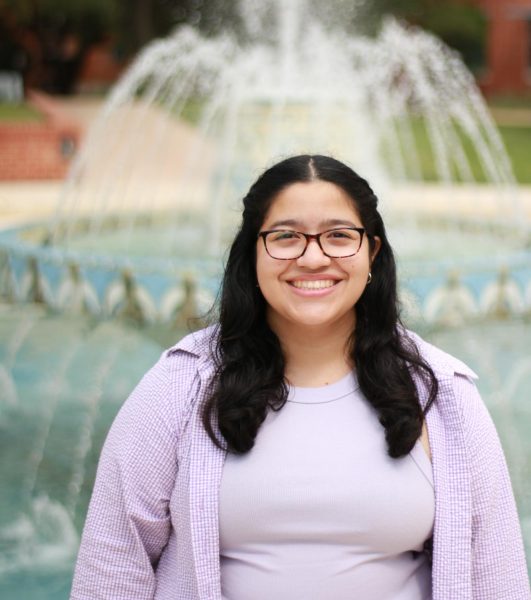
Hi! My name is Monica Martinez, and I’m a Sophomore business major. I am a news reporter for the Trinitonian and I love cats! I’m a trumpet player...

My name is Claire Sammons and I am an Anthropology and Communications double major. I have worked for the Trinitonian since fall of 2020. I became a photographer...

